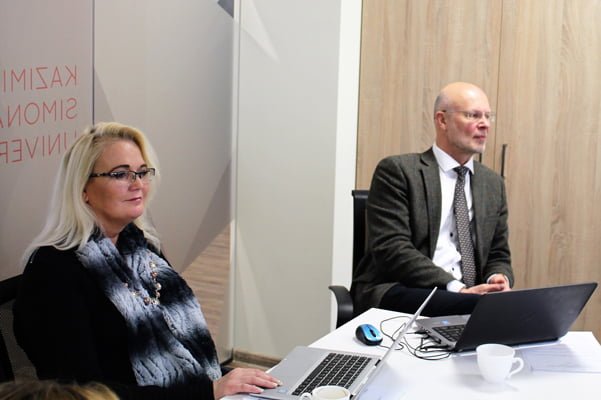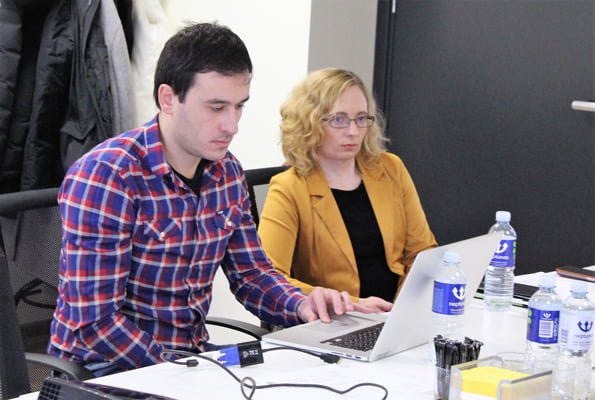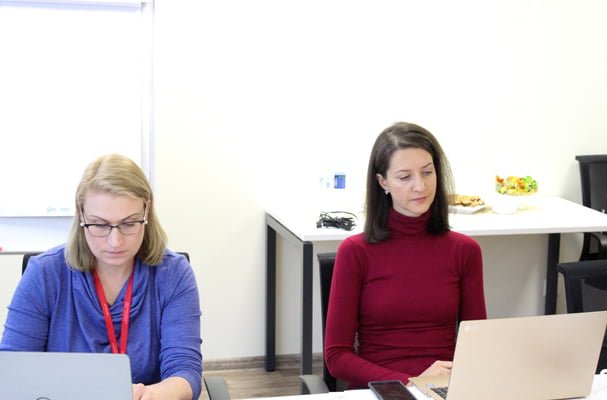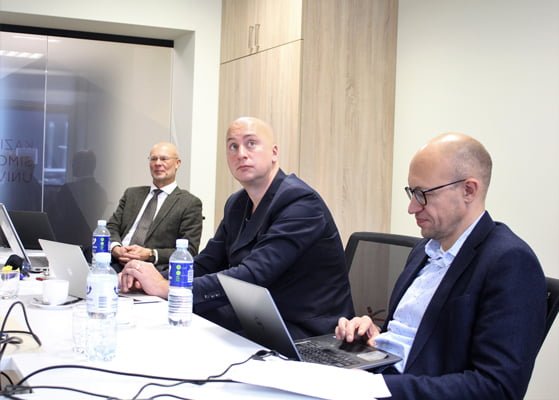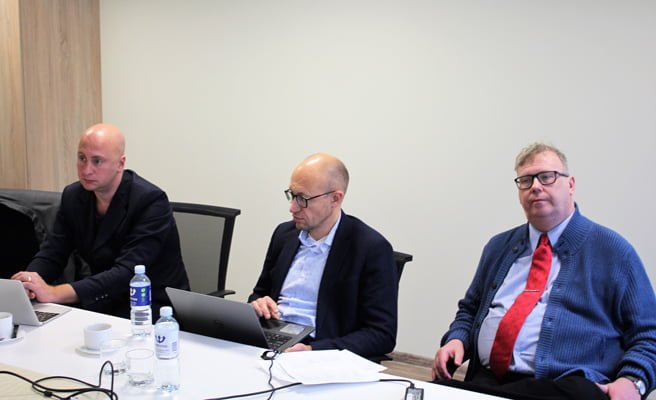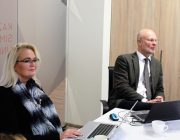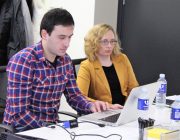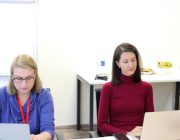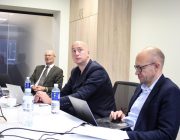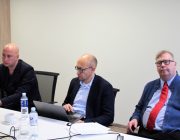Kazimiero Simonavičiaus University continues developing an international cooperation network with foreign universities. Last week KSU has been visited by Olena Sviatun PHD, Associate Professor, Chair of Comparative and European Law, Taras Shevchenko National University of Kyiv.
The guest and KSU Rector prof. dr. Arūnas Augustinaitis discussed the possibility of a double degree diploma in Master of Law programs.
We kindly invite KSU students and others to open lectures at Kazimieras Simonavičius University given by international lecturers.
7 May – Lecturer Esin Benhür Aktürk from Istanbul Aydin University (Turkey) will give lecture “Importance of human recourse and public relations”. Lecture will start at 16.05 in room no. 209.
10 May – Lecturer Melis Türkan Parlak from Istanbul Aydin University (Turkey) will give lecture “Protection of human rights in peace and war time. Human rights protection mechanism under international law”. Lecture will start at 10.15 in room no. 204.
14 May – Lecturer Marcin Białecki from The Cardinal Wyszynski University (Poland) will give lecture “The legal framework of child abduction cases with the focus on mediation”. Lecture will start at 12.00 in room no. 204.
15 May – Lecturers Aleksandra Pieloch-Babiarz and Tomasz Sosnowski from University of Lodz (Poland) will give lecture “Business idea development”. Lecture will start at 13.40 in room no. 214.
All students of Aviation Management are invited to participated in the competition for participation in International Aviation School which will be organized in frames of Erasmus+ project “SPREAD YOUR WINGS”.
The main aim of this project is to increase the quality and relevance of knowledge and skills of Aviation Management students in response to the needs of the labour market and the socio-economic environment. There will be created a new course “The Development of Sustainable Aviation” which will include the topics related to a new conceptual model of responsible and conscious aviation that sees its development in line with the interests of the social and natural environment and takes into account existing ecological barriers and expectations of the society.
Project is implemented by three partners:
- University of Information Technology and Management in Rzeszow, Poland (project leader);
- Kazimieras Simonavičius University, Lithuania;
- Transport and Telecommunication Institute, Latvia.
International Aviation School will take place in Latvia, Riga on 23-27 September 2019.
Selected candidates will have to prepare and participate in activities in Latvia, and will be awarded with 6 ECTS credits according to their completion of the assignments during the activities.
HOW TO PARTICIPATE
All candidates must submit the following documents:
The documents must be provided to the International Relations Office (room no. 201). The submitted materials will not be returned.
Jury will select 3 applications rated as the best among the submitted applications. Only these 3 applicants will participate in International Aviation School together with other 6 students from Poland and Latvia.
DEADLINE
Documents must be submitted no later than 25.04.2018.
ADDITIONAL INFORMATION
- The schedule of the International Aviation School will be provided to the participants at least 2 months before the activities.
- Students are expected to attend all classes during International Aviation School.
- Each participant will receive 455 EUR for living and travel costs for activities in Latvia.
Should you have any questions, please do not hesitate to contact by e-mail international@ksu.lt or phone +370 686 34423.

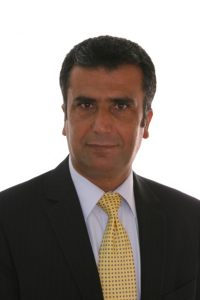
Jack Romero
The aviation industry is one of the most resilient industries in the globe. It has survived banking collapses, economic downturns, terrorism and the growth trend is upward and above 5% annually. Aviation supports over 65 million jobs and generates $2.7 trillion in economic activity (2018). Over 4.3 billion people travelled (2018) up from 3.1 billion (2013) and this figure is set to rise to over 8.2 billion by 2037. Boeing aircraft manufacturer has forecasted a long-term demand for 42,700 new airplanes, valued at $6.3 trillion. The main drivers for growth in the aviation industry are increasing population, increasing middle class with significant sending power and almost all want to travel. Working for the industry is very rewarding, challenging and with one type of qualification, say from KSU, and a student graduate could work anywhere in the world – we all follow the same operating and safety procedures.
At KSU a student will get solid foundation, training and education in the aviation industry supported by highly respected and experienced lecturers, industry experts from all over the world. Teaching methods are designed for the 21st century’s educational aspirations, not just reading books and doing a homework! There are projects to work on, explore and investigate and every intricate detail within the industry is examined, assessed and ultimately used in real life scenarios. Lithuania is an ideal location for aviation studies. It’s in the heart of the EU with close connections to the biggest players in the industry such as Lufthansa, British Airways and KLM. Living costs are very reasonable, communication is favourable and Lithuanian people are very polite, hospitable and friendly – equally, they are very efficient, hardworking and excel at almost everything they engage in.
Working in the aviation industry, after graduation especially when study id completed at KSU is guaranteed by the sheer fact that demand for aviation employees are very high and in constant demand, worldwide.
Jack Romero
Business Mentor and University lecturer at Leeds University Business School
Aviation Management Lecturer at Kazimieras Simonavicius University
Starting in 1974 at Heathrow Airport, Jack’s company British Mediterranean Airways (BMED) grew from a one aircraft and 65 employees operator to a nine aircraft operation employing over 1,000 people. The airline became one of the most successful franchise partners of British Airways, gaining the prestigious Queen’s Award For Business Enterprise in 2004. BMED was sold to BMI (owned by Lufthansa) in 2007 for £30 million, and in 2011 British Airways bought BMI/BMED for over £175 million.
We kindly invite KSU students and others to open lectures at Kazimieras Simonavičius University given by international lecturers.
11 April – Lecturer Toth J. Zoltan from Karoli Gaspar University (Hungary) will give lectures “Constitutional development and current constitutional system of Hungary” and “Death penalty and human rights: how to find the balance in multi – national societies”. Lectures will start at 10.15 in room no. 210.
16 April – Lecturer Mustafa Algül from Nisantasi University (Turkey) will give lecture “The history of Turkish cinema and its industry”. Lecture will start at 14.20 in room no. 212.
Kazimieras Simonavičius University together with 14 international partners successfully implemented the project “Investing in Entrepreneurial Universities in Caucasus and Central Asia” which was financed under Erasmus+ Programme (Key Action 2 – Capacity Building in the field of Higher Education).
Project partners:
- Otto-von-Guericke-University Magdeburg, Germany (the leading partner)
- Masaryk University, Czech Republic
- Vrije University Brussel, Belgium
- Kazimieras Simonavičius University, Lithuania
- University of Minho, Portugal
- Glasgow Caledonian University, UK
- Ilia State University, Georgia
- Caucasus University, Georgia
- Bank of Georgia University, Georgia
- Kutaisi University, Georgia
- Kyrgyz Economic University, Kyrgyz Republic
- International Ataturk Alatoo University, Kyrgyz Republic
- Issyk-Kul State University, Kyrgyz Republic
- University of Economy and Enterprises, Kyrgyz Republic
- Association of Educational Establishments “Education Network”, Kyrgyz Republic
The main goal of the project was to enhance entrepreneurial culture and creativity within higher education in Georgia and Kyrgyz Republic and to strengthen the role of higher education institutions as an active stakeholder that contributes to the socio-economic development of society by fostering cooperation enterprise-university at both academic and industry level as well as between EU and beneficiary countries. The project achieved this goal by developing a creative and supportive environment at institutional level through the establishment of CreaLABs and a network of them in Georgia and Kyrgyz Republic. These networks are serving as platforms to encourage and foster students’ entrepreneurial ideas and at the same time support the bridge that links enterprises and universities for the benefit of innovation and socio-economic development in beneficiary countries.
During the project the following results were achieved:
- European best practices in the production of innovation and preparation of documents necessary for enhancing entrepreneurship in HEIs through interaction between university-enterprises were disseminated in Georgia and Kyrgyz Republic.
- Creative centres (CreaLABs) were set up and equipped in each GE and KG HEI to support students and researchers ideas that can potentially end up in the market and commercial products through entrepreneurship and open innovation.
- Improved skills and competences of staff working in CreatLABs to support entrepreneurship and bring closer enterprises and universities.
- Designed an intensive training programme on teaching entrepreneurship for professors and students seeking to integrate effective and new methods of teaching entrepreneurship in the respective courses through case-studies and problem-solving methods.
- Implemented pilot activities which were organised by CreaLABs.
- Created a network of professors and practitioners to encourage entrepreneurship and cooperation enterprise-university in beneficiary countries.
The project was implemented on October 2015 – March 2019.
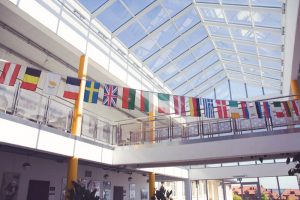
A member of the European Parliament Antanas Guoga visited Kazimieras Simonavičius University yesterday. KSU Rector prof. dr. Arūnas Augustinaitis and KSU Business School Professor dr. Birutė Teodora Visokavičienė discussed the model of universal base income as an alternative of 21st century poverty, inequality and exclusion. Also, economic assumptions, sustainability and philosophy of adaptation of the universal base income model were discussed during the meeting. Activities and plans of KSU Global Economy Center have been presented as well as the researches carried out by KSU in the field of big data, future foresight and linguistic technologies.
Antanas Guoga and KSU representatives discussed about the development and innovative potential of Lithuania’s regions, economic development and social challenges.
Next week we kindly invite KSU students and others to open lectures at Kazimieras Simonavičius University given by international lecturers.
2 April – Lecturer Azra Ahmic from International University Travnik (Bosnia & Herzegovina) will give lecture “Sustainability Management”. Lecture will start at 8.30 in room no. 214.
6 April – Lecturer Rafal Ozarowski from University of Business and Administration in Gdynia (Poland) will give lecture “War in Syria as a battlefield of super and regional powers. The ways of seeking the conflict resolution”. Lecture will start at 14.20 in room no. 214.
On 7 – 8 March, Director of KSU Business School Deimantė Žilinskienė participates in the international conference “Entrepreneurship and Development from regional Perspective. Exchange of Academic Experiences among Erasmus+ Program Countries” where gives the report “Leading tendencies of regional development from the perspective of globalisation” and participates in the working group on international scientific cooperation in the fields of entrepreneurship and social innovation.
The conference is organised by KSU partner in Poland, University of Information Technology and Management.
Open inception workshop “Dos and Don’ts of Big Data for Foresight“ took place at Turku, Finland on 28 February, 2019. Workshop was organised by University of Turku (UT) (Finland) and Kazimieras Simonavičius University (KSU) (Lithuania) within the framework of KSU R&D project “Platforms of Big Data Foresight (PLATBIDAFO)”.
Participants from KSU, UT, other higher education institutions, public sector and industry discussed new models of Big Data and Future Foresight methodologies and their social and business applications. Speakers introduced innovative tools for identification and analysis of large-scale social issues, new mechanisms for business decision support and new approaches to strategic planning for decision-makers. Topics discussed at workshop included strategic positioning in Big Data utilisation, using world-class data science resources to create smart and wise Turku city, Big Data potential for integrated territorial policy development in the European growth corridors, new possibilities in crowdsourcing Delphi method in Future Foresight, using systematic Foresight tools (the case of Futures Platform).
The project “Platforms of Big Data Foresight (PLATBIDAFO)” is implemented by Big Data Excellence Centre at Kazimieras Simonavičius University and is financed by the Research Council of Lithuania. The project aims to create tools and methodologies, which will enable companies and organisations to tackle social problems by helping them to identify social exclusion, demographic change, regional development and other problems as well as spotting and predicting future trends.
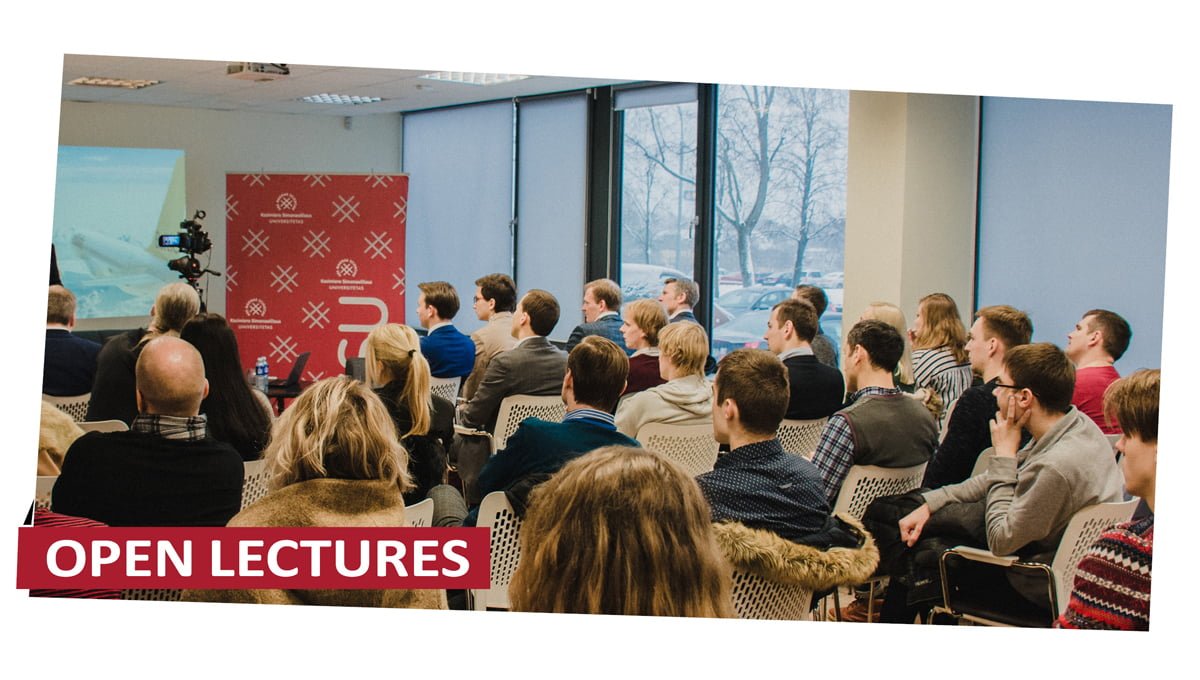 On 11 February we kindly invite KSU students and others to open lectures at Kazimieras Simonavičius University by international lecturers.
On 11 February we kindly invite KSU students and others to open lectures at Kazimieras Simonavičius University by international lecturers.
Lecturer Ömer AYDINLIOĞLU from Cumhuriyet University (Turkey) will give lecture „Brand Placement in Turkey”. Lecture will start at 12.00 in room no. 204.
Professors Juan Manuel Barceló Sánchez ir Francisco Cabezuelo Lorenzo from University of Madrid (Spain) will give lecture „Communication strategies and intercultural communication in companies”. Lecture will start at 14.20 in room no. 214.
Lecturer Ozan Özpay from Cumhuriyet University (Turkey) will give lecture „History of Turkish cinema”. Lecture will start at 16.05 in room no. 204.
In 4th of December was organized first project „Platforms of big data foresight“ kickoff meeting with all project partners: dr. Jari Kaivo-oja, dr. Steffen Roth, Dr. Levan Bzhalava, dr. Theresa Lauraeus, Mikkel Knudsen, KSU rector prof. dr. Arūnas Augustinaitis, doc. dr. Austė Kiškienė, KSU cancler Darius Verbyla with dr. Mathew Ferns (via interet conference). Lead partner Jari Kaivo-oja informed all participants on general requirements of project implementation, including financial aspects, communication and reporting needs. All project experts discussed about main tasks in project, project work plan and time schedule.
Project results will be extremely valuable for future foresight in long term perspective, forecasting various social, economic, geopolitical processes, e.g. forecasting behavior of refugees and also start operating Hackathon events in the field of Big Data Economy and Foresight.
The project is funded by the European Regional Development Fund.
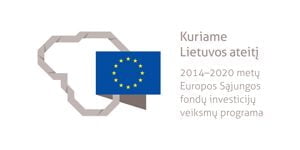





 On 11 February we kindly invite KSU students and others to open lectures at Kazimieras Simonavičius University by international lecturers.
On 11 February we kindly invite KSU students and others to open lectures at Kazimieras Simonavičius University by international lecturers.